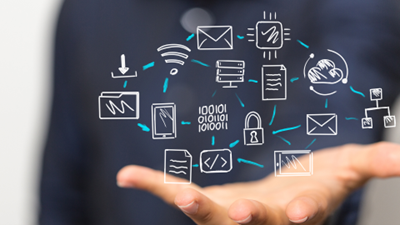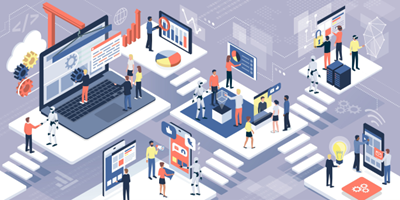As the world embraces digital transformation, forward-looking organizations are incorporating dynamic service provisioning and smart building technologies into their facility management models. These innovative approaches allow for a flexible level of workplace services based on real-time occupancy and data-driven insights. With nearly 80% of CRE executives planning to incorporate at least 10 of 15 key technologies required for the hybrid model, it’s clear that hybrid, collaborative, and automated work models are becoming the new reality for global organizations.

Embracing Digital Transformation and Hybrid Work Models
Employers are increasingly focused on employee retention, cultivating a tech-savvy workforce, sustainable digital workplace practices, and remote and hybrid working. Enterprise IT and workplace leaders are at the center stage of digital transformation, with the three underlying components that will shape the workplace of tomorrow being organizational acceptance of the digital workplace, foundational technologies to support digital workplace success, and onboarding and educating employees. A CISCO Global Hybrid Work Study found that most respondents cited improvements in well-being, work-life balance, relationships, and personal confidence in hybrid settings.

Technologies and Security Protocols for the Hybrid Workplace
Technologies like Zero Trust, split tunnel VPNs, endpoint security, DNS filtering, multifactor authentication, and network automation are important for supporting hybrid work. Full-stack observability is urgent in a hybrid world, and CIOs need to focus on security protocols and develop provisioning and permissions for collaboration tools. Cloud-native solutions, videoconferencing, and collaboration tools help prevent remote workers from feeling isolated and improve communication.

Empowering Employees and Boosting Engagement
CIOs must empower their teams to adopt tools that improve flexibility and decision-making. Self-service analytics is a great way to boost employee engagement and make business decisions based on actionable insights. The future state of the digital workplace will involve partnering with conversational AI chatbots to alleviate the burden of low-level tasks. The digital workplace must be capable of measuring individual well-being, collaboration between teams, and organizational innovation to meet the demands of tomorrow’s workforce.

Automation and the Global Labor Market
Automation tools can increase efficiency and productivity in remote and hybrid work settings. Hybrid work enables access to a global labor market, giving employees more agency over their destinies. IT departments are designers of the future of work, and informality in management practices is a net positive in hybrid work. Rituals like check-ins, happy hours, and meetings are important for maintaining a strong company culture in the era of remote and hybrid work.

